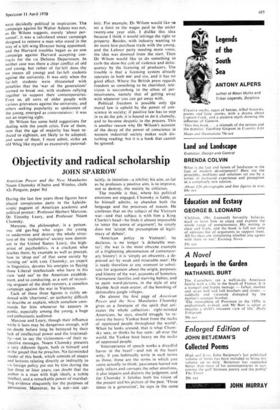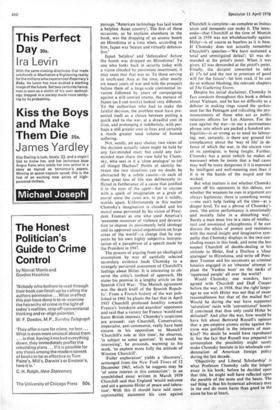Objectivity and radical scholarship
JOHN SPARROW
American Power and the New Mandarins
Noam Chomsky (Chatto and Windus, cloth 42s Penguin, paper 8s) During the last few years three figures have played conspicuous parts in the kaleido- scopic pageant of American academic and political protest: Professor Herbert Marcuse, Dr Timothy Leary, and Professor Noam Chomsky.
Marcuse, the philosopher, is a poison- ous old gas-bag who urges the young to undermine and destroy the whole struc- ture of the 'exploitative' society now domin- ant in the United States; Leary, the high- priest of psychedelics, is a crackpot who teaches them, by example as well as precept, how to 'drop out' of that same society by 'turning on' with LSD; Chomsky, an expert in linguistics, devotes his energies to flaying those Liberal intellectuals who have in his view 'sold out' to the American establish- ment, and to conducting, as a sort of recruit- ing sergeant of the draft-resisters, a ceaseless campaign against the war in Vietnam.
Each of these three figures is richly en- dowed with 'charisma', an authority difficult to describe or explain, which somehow com- mands for him whenever he appears in public, especially among the young, a huge and enthusiastic audience.
Marcuse and Leary, though their influence while it lasts may be dangerous enough, will no doubt before long be betrayed by their lack of intellectual power and the irrational- ity—not to say the viciousness—of their re- spective messages. Noam Chomsky presents a very different figure, both in himself and in the gospel that he preaches. No fairminded reader of this book, which consists of essays and lectures relating directly or indirectly to us foreign policy put out by him during the last three or four years, can doubt that the author is a man with high ideals, a subtle intellect, and a remarkable power of marshal- ling evidence eloquently for the purposes of persuasion. Moreover, he is not—not cer-
tainly, in intention—a nihilist; his aim, so far as he professes a positive aim, is to improve, not to destroy, the society he criticises.
The trouble is that, where his political emotions are engaged, Chomsky is liable, as he himself admits, to abandon both the language and the processes of reason. He confesses that on the subject of the Vietnam war—and that subject is with him a King Charles's head—he finds it almost impossible to 'enter the arena of argument': he simply does not 'accept the presumption of legiti- macy of debate'.
'American policy in Vietnam', he declares, is no longer 'a debatable mat- ter': the war is the most obscene example of a frightening phenomenon of contempor- ary history': it is 'simply an obscenity, a de- praved act by weak and miserable men'. He is ready therefore at any moment to substi- tute for argument about the origin, purposes, and history of the war, accounts of homeless Vietnamese families and starving babies, and to paint word-pictures, in the style of any Marble Arch mob orator, of the bombing of defenceless jungle villages.
On almost the first page of American Power and the New Mandarins Chomsky gives us a foretaste of the spirit that ani- mates the whole collection: right-minded Americans, he says, should struggle `to re- move the heavy Yankee boot from the necks of oppiessed people throughout the world'. When he looks around, that is what Chom- sky sees, or thinks he has seen: all over the world, the Yankee boot heavy on the necks of oppressed people.
'Intemperance of speech works a dreadful havoc in the heart'—and not in the heart only; if you habitually write in such terms as those, those are the terms in which you come actually to think; passionate hatred not only infects and corrupts the other emotions, it also impairs and distorts the judgment, and for Chomsky it falsifies both his vision of the present and his picture of the past. 'Three times in a generation', he says in the same
passage, 'American technology has laid waste a helpless Asian country'. The first of these
occasions, as he explains elsewhere in the book, was the dropping of an atomic bomb on Hiroshima at a time when, according to him, Japan was 'beaten and virtually defence4 less.'
Japan 'helpless' and 'defenceless' before the bomb was dropped on Hiroshima! To one who looks back in security today with a vision clouded by passionate resentment, it may seem that that was so. To those serving in south-east Asia at the time, after nearly six weary years of war and with the prospect before them of a large-scale continental in- vasion followed by years of campaigning against a still untried enemy, the menace of Japan (as I can testify) looked very different.
To the authorities who had to make the fateful decision, the problem must have pre- sented itself as a choice between putting a quick end to the war, at a dreadful cost in lives, and prolonging it indefinitely, with per- haps a still greater cost in lives and certainly a much greater total volume of human suffering.
Not, surely, an easy choice; two views of the decision actually taken might be held by any fair-minded man; but could any fair- minded man share the view held by Chom- sky, who sees in it a 'close analogue' to (of all things) Dachau? Points of identity be- tween the two situations can no doubt be abstracted by a subtle casuist—in each of them great loss of life was deliberately in- flicted in furtherance of a cause that justified it in the eyes of the agent—but to anyone with a spark of imagination or a grain of moral sense the cases are, to put it mildly, worlds apart. Unfortunately in this matter Chomsky's imagination is clouded and his moral sense perverted by his vision of Presi- dent Truman as one who used America's 'awesome resources of violence and devasta- tion to impose its passionately held ideology and its approved social organisation on large
areas of the world'—a charge that he sup- ports by his own highly subjective interpre- tation of a paraphrase of a speech made by the President in 1947.
The process of arguing from an ideological assumption by way of carefully selected secondary evidence leads Chomsky to a strangely perverted assessment of Churchill's feelings about Hitler. It is interesting to ob- serve the critic's method of approach. He states his premise in a lengthy article on the Spanish Civil War: 'The Munich agreement was the death knell of the Spanish Repub- lic'. From a French history of the war pub- lished in 1961 he gleans the fact that in April 1937 Churchill professed hostility towards Franco's `trotskyist and anarchist' opponents and said that a victory for Franco 'would not harm British interests.' Chomsky's suspicions are aroused: can Churchill, Conservative, imperialist, anti-communist, really have been sincere in his opposition to Munich?
'Churchill's role at this time', he observes, 'is subject to some question'. 'It would be interesting', he proceeds, warming to his work, `to explore more fully the attitude of Winston Churchill'.
'Fuller exploration' yields a 'discovery', scrounged from the New York Times of 12
December 1965, which he suggests may be 'of some interest in this connection': in an unpublished essay written in March 1939 Churchill said that England 'would welcome and aid a genuine Hitler of peace and tolera- tion'. With this (I should have said unex- ceptionable) statement his case against Churchill is complete—as complete as insinui ation and innuendo can make it. The innu- endo—that Churchill at the time of Munich and in 1939 was not wholeheartedly against Hitler—is of course as baseless as it is base.
If Chomsky does not actually remember Churchill's speeches—We have sustained a total and unmitigated defeat'; 'fl was de- manded at the pistol's point. When it was
given, £2 was demanded at the pistol's point. Finally, the dictator consented to take
Ll 17s 6d and the rest in promises of good will for the future'—let him read, if he can do so without blushing, the relevant chapters of The Gathering Storm.
Despite his initial disclaimer, Chomsky in fact conducts throughout this book a debate about Vietnam, and he has no difficulty as a debater in making rings round the spokes- men for the Pentagon and ridiculing the pro- nouncements of those who act as public relations officers for Los Alamos. For the case against the war—to use a portmanteau phrase into which are packed a hundred am- biguities—is so strong as to need no labour- ing, nor, certainly, is there any ground for complacency about the 'way of life' in de- fence of which the war, in the sincere view of its apologists, is being fought. Further, Chomsky has a point (which he makes ad nauseam) when he insists that a bad cause may well be more dangerous if it is espoused by intelligent and well-meaning men than if it is in the hands of the stupid and the wicked.
But what matters is not whether Chomsky scores off his opponents in this debate, nor whether the weapons he uses in argument are always legitimate; there is something wrong —one can't help feeling all the time—at a deeper level. To use a phrase of Chomsky's own, 'the entire performance is emotionally and morally false in a disturbing way'. Surely a man must live in a state of intellec- tual and emotional schizophrenia if he can discuss the ethics of protest and resistance with the moral insight and imaginative sym- pathy that Chomsky displays in the two con- cluding essays in this book, and none the less suspect Churchill of double-dealing in his attitude to Hitler, find a Dachau a 'close analogue' to Hiroshima, and write off Presi- dent Truman and his successors as criminal lunatics engaged in an 'obscene' attempt to plant the 'Yankee boot' on the necks of 'oppressed people' all over the world?
Would Chomsky, one wonders, have agreed with Churchill and Duff Cooper before the war, in 1938, that the right langu- age to use with Hitler was not that of sweet reasonableness but that of the mailed fist?
Would he during the war have supported 'saturation' raids with 'conventional' bombs
if convinced that thus only could Hitler be defeated? And after the war, how would he have felt about Bertrand Russell's opinion that a pre-emptive atomic strike against the USSR was justified in the interests of man- kind? No doubt he would have reprobated it; but the fact that Russell was prepared to contemplate the possibility might surely make Chomsky hesitate in his wholesale con- demnation of American foreign policy during the last decade.
'Objectivity and Liberal Scholarship' is what Professor Chomsky calls the longest essay in his book; before he decided upon that title, he might well have reflected upon the parable of the mote and the beam. The sad thing is that his hysterical advocacy may in the end do more harm than good to the cause he has at heart.







































 Previous page
Previous page